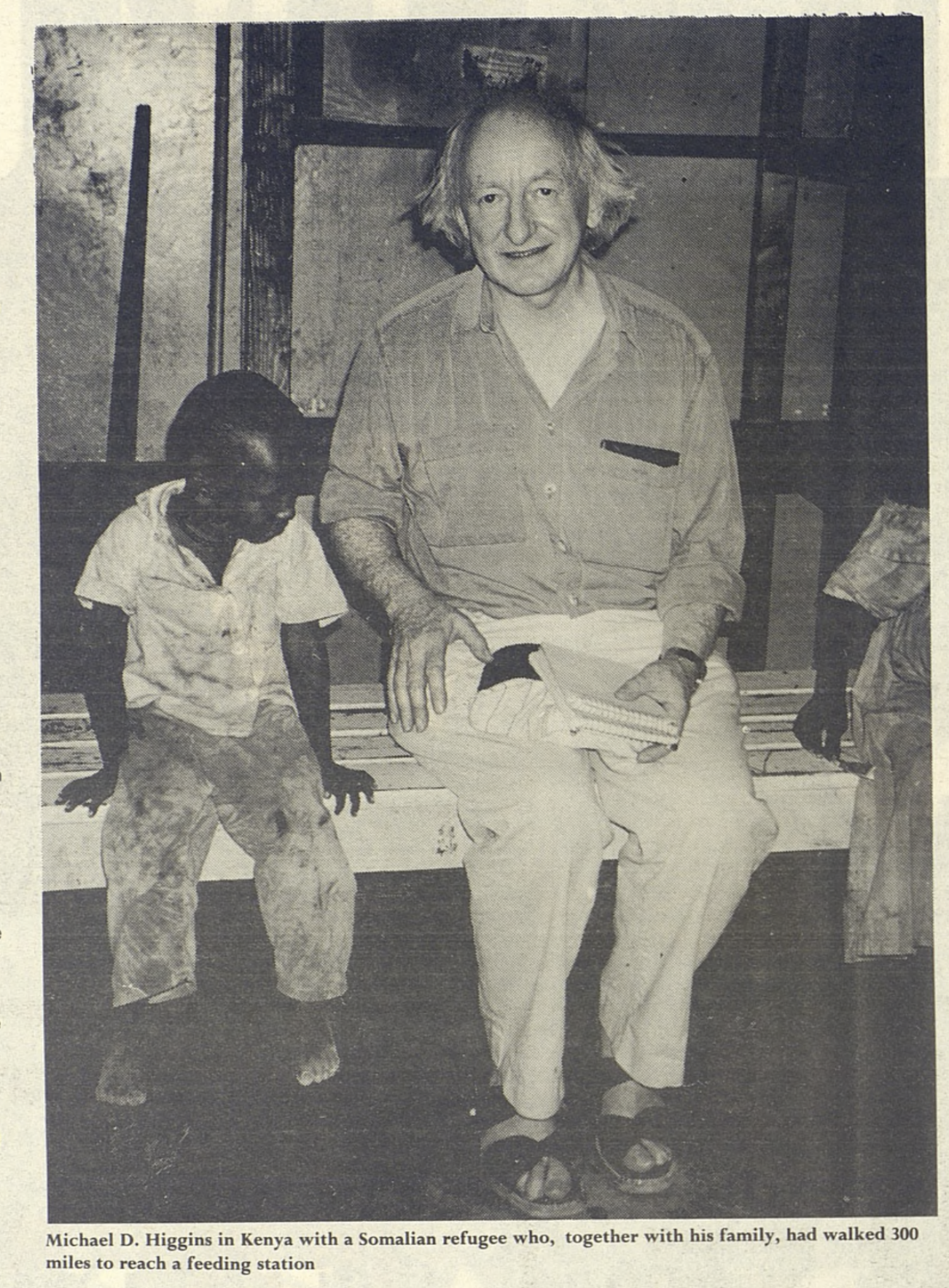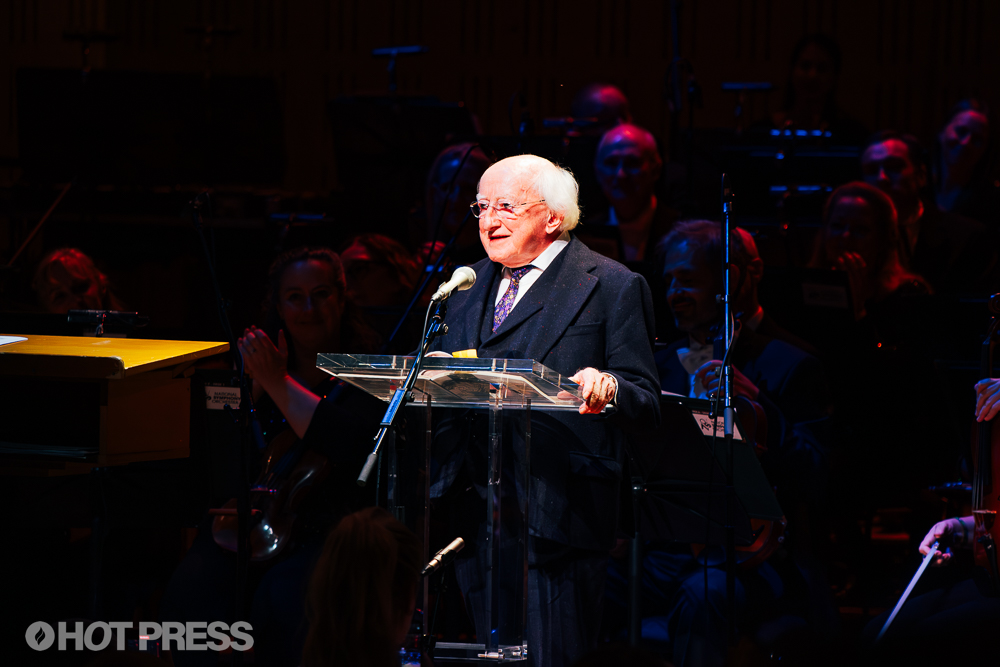- Opinion
- 03 Nov 25
Michael D. Higgins: What always shines through is the vision, the world-view, the degree to which his core values of social justice and equality are undimmed by office

There will be tears but no recriminations. At the end of his 14-year stint as President of Ireland, The Whole Hog pays tribute to a man whose legacy is unparalleled in Irish political history...
And so, though we might wish it were otherwise, the big wheel turns again. An era is ending before our eyes.
Life imitates art and politics mimics theatre, so the show will go on.
But it won’t be the same. How could it?
One of the elders on Hog Hill recalls a random ancient verse from schooldays:
“I walked entranced/ Through a land of Morn/ The sun with wondrous excess of light/ Shone down and glanced/ Over seas of corn/ And lustrous gardens aleft and right…”
These are the opening lines of A Vision of Connaught in the Thirteenth Century by James Clarence Mangan and not, as some might think, a rhymer’s take on Bloom in the Phoenix Park!
The poem refers to Connacht during the kingship of Cahal Mór of the Wine Red Hand.
A similar sense of well-being, fecundity and being graced by the fates infuses our recollection of 21st century Ireland as Michael D Higgins’ two terms unfolded.
In time to come, indeed possibly already, we’ll remember it as a kind of golden age.
Issues that had crippled us socially were addressed, for example the introduction, by popular vote, of marriage equality in 2015 and the repeal of the 8th Amendment in 2018.
Cometh the hour, cometh the man. Or perhaps it’s cometh the man, cometh the hour.
His journey from a very disadvantaged childhood in Co. Limerick to the Áras has been characterised from the outset by deeply held values, including social justice, educational equality and equal pay for women and those with disabilities, and the pursuit of peace and social and economic justice in disadvantaged parts of the world.
His political apprenticeship was influenced by Dr Noel Browne in Galway, the great crusader against TB in 1948.
Browne fell in battle with the Catholic hierarchy over the mother-and-child scheme. He wasn’t one who’d accept an Irish solution to an Irish problem in pursuit of social justice so he didn’t bend the knee.
Recognising that the local is global and the global is local, Michael D also took a keen interest in international affairs and, in particular, the impact of colonialism and economic imperialism on human rights.
AN ELECTRIFYING ORATOR
Unlike many with strong opinions on these matters, he did his field work too.
His actions in El Salvador helped expose the El Mozote massacre by government forces, and his reports and pressure, generated international anger.
This wasn’t an assignment for the faint-hearted and demanded a stubborn resistance to heat and humidity, mosquitoes, dirty water, arrest and deportation by El Salvador armed forces.
It also fostered a sympathy for the Irish who laboured in such troubled areas, and there have been many; and an empathy with what were once termed the wretched of the earth – those bullied, exploited, expelled and erased by the powerful in pursuit of ever greater riches.

He began a column in Hot Press in 1982. It provided a forum to address Irish and global ideas and issues, and also to reach a new generation that was uneasy with the way the world was going as well as impatient with the way Ireland had been run.
He was also very engaged with the arts, theatre, music, poetry. His wife Sabina, whom he married in 1974 is an accomplished actor.
The various interests merged in 1993 when he was appointed Minister for Arts, Culture and the Gaeltacht. Wags weren’t long in renaming his responsibility as Minister for Fun.
It was a very significant appointment, leading to the re-establishment of The Irish Film Board (which had been closed by Charles Haughey in 1987) and the launch of Telefis na Gaeilge, now TG4.
Some of the brief was intensely political. For example, he repealed Section 31 of the Broadcasting Act (which had been activated in 1977), thus allowing Sinn Fein representatives to be interviewed on Irish television and radio.
Two decades later (as Labour spokesman) he re-engaged with international matters. Key interests included the Gulf and Middle East.
He was closely involved with the Israel-Palestine conflict – which he had written about in his Hot Press column – and in August 2005 participated in a European fact-finding trip to the region organised by United Civilians for Peace.
In the last decade and a half, as President, he has drawn these myriad strands together, and more.
He has further defined – and dignified – the office of Uachtaráin na hÉireann, his two terms marking a high water mark in political popularity.
His ratings aren’t just the envy of Irish politicians, they’re the envy of global leaders and artists too.
When they made him, they broke the mould.
His popularity isn’t achieved through sludgy populism, by descending to the lowest common denominator, going low when one should go high.
Far from it. He also speaks his mind, and ours, an electrifying orator when the occasion demands, his speeches meticulously researched and drafted, informed by values and principles and his own past activism.
That it works so well is a reminder to politicians that voters aren’t idiots and you can prosper by being true to yourself, and honest, consistent and unafraid.
SOCIAL JUSTICE AND EQUALITY
The affection felt for Michael D is at once cellular and global. It’s all-encompassing.
He’s a man of politics and political discourse, at ease interacting with both Irish politicians and world leaders. But he’s also a man of the people and speaks (entirely without condescension) to all, young and old.
Then again, he’s a football man, and it’s no passing fancy. Even if the passing isn’t always fancy. Or to his fancy!
He’s a man of letters, an oracle and poet entirely at home with those who write, whatever it might be, and also with his own pen, paper and post-it notes.
He’s a man of the arts, as myriad musicians, painters, sculptors, writers, performers will attest. Not only have The Saw Doctors and Christy Moore honoured him in recordings, he’s released his own recordings and writings too.
As we learned during the Covid pandemic, he’s not afraid of the sciences.
And, of course, always and ever, he’s still a patron of the Ministry of Fun, his twinkling eyes and sense of mischief rarely far beneath the surface.
He’s our man for all seasons, at home in all these worlds. He contains multitudes.
There’s his knowledge and intelligence, yes. But also wisdom, empathy and compassion. And passion. And poetry.

Against All Certainty, A Celebration of Michael D. Higgins at The National Concert Hall on September 5th, 2025. Copyright Abigail Ring/ hotpress.com
What always shines through is the vision, the world-view, the degree to which his core values of social justice and equality are undimmed by office, and likewise his love of the arts.
It’s said that politicians campaign in poetry and govern in prose.
Perhaps. But being Uachtarán na hÉireann is one role where vision and poetry can infuse the machinery of State and Michael D has obliged, in spades. Or perhaps that should be in hearts?
As his presidency ends, Michael D is, by a vast margin, the most popular public figure in Ireland. What we wouldn’t give for another term!
But it can’t be and so, this chapter must come to a close.
James Clarence Mangan’s A Vision of Connaught in the Thirteenth Century strikes a far gloomier note in its second half.
“...behold! A change/ From light to darkness/ From joy to woe…”
Likewise Ireland in 2025, perhaps, with trouble brewing on many fronts.
Can we soldier on? Yes, because we must.
Ever onwards, as the Hog elders like to say. Ever onwards.
Best wishes, old friend.
RELATED

- Opinion
- 26 Jan 26
Venezuelans in Ireland look to the future with "hope" and "uncertainty"

- Opinion
- 13 Jan 26
Minister Helen McEntee announces €42 million in aid for Palestine

- Opinion
- 31 Dec 25







